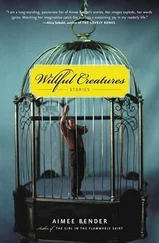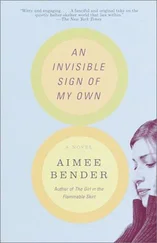What’s the chair doing in your pant leg? I asked. I said it lightly, just trying to be friendly about it.
He said nothing. No more outbursts. He re-opened and clicked up his laptop and read the news. Just observing. Just looking at what was there. I peered closer to see where the chair foot entered his shoe, but the shoe was covered by the hem of his pants, and something, somehow basic, was off. A slightly sick feeling picked up in my throat then, a dizzy feeling, a feeling like I was not going to like this, that whatever I was about to come across wasn’t good. That I should leave, return to the evening, go knock on the door of the red-car woman across the way, ask for food, any kind, to hug her, to go find a man nearby, to call Eddie out of the blue and ask him to take off my clothes, please. Now. Go. The chair leg went wrong, somehow. How? Was he inserting furniture into his body?
Are you in pain? I asked.
I’m okay, he said. He turned around to look at me, with eyes big and gray, and his voice softened, turning almost gentle.
Just go, he said. Rosie.
The room stretched longer, between us. A ringing bell. Maybe once, in our entire childhood, had he called me Rosie. He never even called me Rose. His face, those gray eyes, so big and, for a moment, all kindness. My throat tightened. I did not understand why. I did not understand what was going on.
I went to sit on the floor, at his feet. It was easy, to go kneel at his feet, and he wanted to kick me off, I could tell, but there were chair legs near his legs, so he could not kick me. And he could’ve grabbed me with his hand, pushed me away, but he didn’t, and that gentleness was still in him: Rosie, he’d said, and I reached down, and when I lifted up the pant leg, there was no cut. I don’t even know how to describe it, what I saw. There was no blood at all, and how good it would’ve been, to see blood-to see it pouring out of his leg, and the surgery he would’ve needed, the painkillers, the beige rug soaking through.
All I could grasp was just that he had not inserted the chair leg into his own, but that somehow it was mostly just a chair leg there, dressed in a sock, going into his shoe. No flesh leg visible at all, or only some kind of faint shimmer of leg that I could hardly see clearly. Had he cut off his legs? No. Again: no blood there, none. Instead, there was only that shimmer of human leg around the leg of the chair, a soft fading halo of humanness around the sturdy metal of the chair, a shifting of textures that somehow made sense. It looked like a natural assertion of chair over him, like the chair was dispelling him, or absorbing him, as natural as if that was the way it was with everyone. And then the chair leg, with its rubber foot, went inside his shoe, which no longer seemed to hold a human foot at all.
I sat there. I did not say anything. I held on to his knee, the knobby bone of his fleshy knee.
In the silence, something big and wordless. Those Morehead chairs, scattered throughout his apartment. How I’d show up, one day, and all the other furniture would be out on the balcony with the bed, and only four Morehead chairs would be in his apartment. Plus some pens and shoes.
I love them, he’d told my mom, as each one came in the mail. They’re great, so functional.
How rarely we heard him use the word love . Or, for that matter, great . He was sitting on the floor of the living room, in high school, cross-legged in front of the red brick fireplace, folding and unfolding the latest. I didn’t really care about the chairs, good or bad, but Joseph loved them, seemed to truly value chairs that could fold so easily into a line. The mailman had started to hate us.
God, she loves them too, said Mom. I can’t stand them-no style. Cheapo.
She stood above Joseph with her hands on her hips. There’s a table, too, she said, and, sure enough, it arrived the following week.
Joseph called Grandma, that night of the fourth chair.
Thank you, he told her, sincerely.
I stood in the hall. He listened to something for a while.
You too, he said.
When he hung up, I was over at his side in a second. I could not give him a moment alone. What’d she say?
She’s not making much sense, he said, brushing at the air. She said something about playing cards, he said. Mah-jongg?
Well, they’re card-table chairs, said Mom.
Can I have them, in my room?
Sure? Mom said, tightening her lips. She eyed a chair, the knobby aluminum screw at its joint, the plastic brown-swirled cushion.
He pulled splinters from her hand, weekly. Even in college, even during finals week. On the couch, with tweezers, for hours.
In his room, he was back to the laptop, clicking. Reading the news, as if I wasn’t there. Frozen focus ahead. The moment of tenderness was over, the gateway had closed, and with the same certainty I’d felt just a few minutes before, about how much I’d had to stay and pay attention, something had flipped, like a pancake, easy, and now I had to go get the telephone and call George for help. Something big was happening with my brother, and I could hardly comprehend what I was seeing. I would have to leave the room for a second, but it had to be slow, this was not something that could happen quickly, and we had been to the hospital before and we could always go again and the doctors could take him back and maybe they would know what to do. It was twenty seconds, it was ten, to stride out of the room, to find the phone in its cradle and pick it up. And I didn’t have a choice then, either; I had to have someone else see this, had to, because Joseph would never confirm it for me, no one would, and I would call George first, it could only be George, only George, who’d believed me years ago when I told him the cookie was angry or the string cheese was tired, only George could be trusted to see what was in front of him. I walked out of the bedroom, strode into the living room, hunted around, found the phone, grabbed it, clicked it to on, and brought it back to Joseph’s room.
Ten seconds, eight. The window was still open, the room dark. Only an empty chair, at a table, supporting a laptop, with the front page of the New York Times , news bright and colorful.
Before I went out of my mind with sadness and bewilderment, and George found me at the market down the street, crying; before I called my mother in Canada and said he was gone again, had left, he had been here and seemed okay and then he was gone; before I called my father and wept incoherence to his secretary; before that, all I knew to do was to mark that one. That was my only lucid thought, and a thought I have felt as proud of as anything I’ve ever done in my life. Was just the impulse to take the one pen I could find in the room, the one on his nightstand, a black ballpoint, and to go to the back of that card-table chair, the one at the desk, one of four, the one in front of the laptop, and to draw a thin wobbly line under Morehead. She always signed her name the same. This one, I said, as I drew the line. Him.
My mother kept good photo albums of the family, up to date. With stickers and captions and exclamation points. In one, she showed me a group picture of us in northern California, visiting distant cousins on a seashore near Sausalito. I peered closely at the people, noting my mother in her pale-green linen dress, my father looking especially tall and tan. Who’s that? I said, pointing to a brown-haired girl with a ponytail in a red T-shirt that reminded me of one of my T-shirts.
That’s you, she said.
What? I said. No, I said.
She laughed at me. It’s you, she said. I think you had a new haircut.
Maybe it was the angle? Or the light, or the fact that I was surrounded by people I never saw again, or the newness of the landscape, but for a few seconds before she told me, I did see myself as a stranger-an average light-brown-haired girl who looked pleasant enough, wearing a familiar red T-shirt I knew from my own closet. Once I knew it was me, the face clicked back into the formation I recognized from all the mirrors of my life. Of course, I said, laughing, as if I had known all along.
Читать дальше












